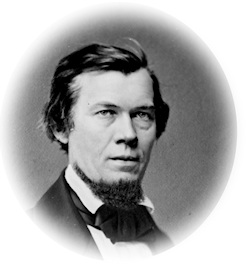Jacob Thompson[i] to Howell Cobb.
Washington, D. C, Jan’y 16th, 1861.
My Dear Cobb, I was glad to receive your letter a few days since. It came the same day that I resigned, and I got Robt. M. McGraw to show it to the President. He folded it up very quietly and returned it to me.
The President and Holt played the meanest trick on me in the world in sending the Star of the West to Charleston. When Holt was assigned to the Department of War, I came home, wrote my resignation and went back in the evening to give it to him in person. I told him the assignment of Holt to the War Department[ii] was considered by me the adoption of his line of policy, which made my withdrawal a necessity. The President replied—not at all, and no order should be issued without being first considered and decided in Cabinet. With this promise I could not resign.
A few days afterwards the question was up, and it was clearly decided to send a messenger to Major Anderson to learn his true condition and wishes. This was all that was decided, and the President’s letter to me is an afterthought and deceptive. The movement of the Star of the West was a strategetical movement of Gen’l Scott. He convinced Holt he could steal into Fort Sumter without discovery or collision. To do this it was necessary to keep the movement a secret, and as they all knew I would resign for such an order and thus blow the order, it was necessary to keep me in ignorance of it. This is the true theory of the whole matter. Since the expedition failed, I have thought it of no importance to push the facts. But I am determined to fortify myself.
Old Buck, at heart, is right and with us, but after Stanton came in, I have seen him gradually giving way. . .
Well, Cobb, I withdrew only one day before the secession of Mississippi would have made it my duty to withdraw. I am now very anxious to see a new confederacy formed. The Black Republicans do not intend to give back one inch. It is now naked submission or secession. I consider every Southern State disgraced who will quietly surrender her rights without a struggle, and, by Jove, the work thus far goes bravely on. Va. will be out in time. The feeling is getting up in Tenn. and Ky., and I think Maryland. I hope Georgia will make quick work of it. You know how much importance I have attached to the action of your State. I have all along felt that as goes Georgia, so goes the whole South.
I have been opposed to the withdrawal of the Senators and Members from the South. But they have decided otherwise, and I am content.
It is impossible to get the President and his cabinet to consider the secession of S. Carolina as a fact. He declared, you know, some time before you left, that he could not and would not know the fact. I think he is gradually realizing the idea that it is a fact, but he will not base any action on it.
When he returned the correspondence with the S. C. Commissioners, I sketched out a programme of a message for the President to write, according entirely with your suggestions in your letter. He had not the nerve and backbone to adopt our views.
Since Seward’s speech of Saturday, I have no hope of any concession; and further effort to obtain a compromise implies in my mind weakness, if not cowardice.
The President still adheres to his position that he has no power of coercion, but he has a most curious idea that enforcing the laws at the point of the bayonet is not coercion. . . .
[i] Secretary of the Interior in Buchanan’s cabinet.
[ii] Joseph Holt, of Kentucky, Postmaster General, 1859-1860, was appointed Secretary of War ad interim upon Floyd’s resignation, and afterward full Secretary for the remainder of Buchanan’s administration.
From Annual Report of the American Historical Association for the Year 1911.
In addition to a success in his law practice and as a cotton planter, Jacob Thompson was involved in state politics and was elected to Congress in 1839, where he served six terms in the House of Representatives as chairman of the Committee on Public Lands and later as chairman of the Committee on Indian Affairs. In 1857, President James Buchanan appointed him Secretary of the Interior.
Jacob resigned at the outbreak of the American Civil War and was appointed Inspector General of the Confederate States Army. In 1864, Jefferson Davis asked Thompson to lead a delegation to Canada, where he appears to have been leader of the Confederate Secret Service. From here, he is known to have organised many anti-Union plots and was suspected of many more, including a possible meeting with Lincoln’s assassin, John Wilkes Booth.
Howell Cobb was an American political figure. A southern Democrat, Cobb was a five-term member of the United States House of Representatives and Speaker of the House from 1849 to 1851. He also served as the 40th Governor of Georgia and as a Secretary of the Treasury under President James Buchanan. Cobb is, however, probably best known as one of the founders of the Confederacy, having served as the President of the Provisional Congress of the Confederate States.
